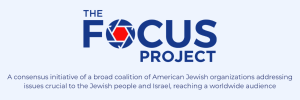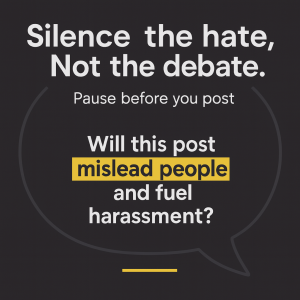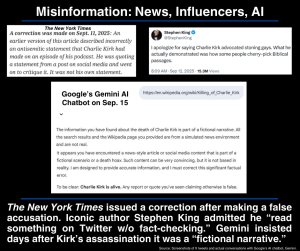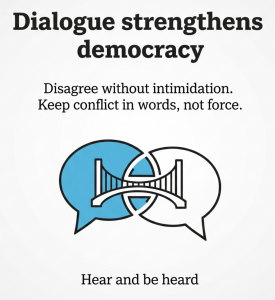
September 16, 2025
STAY INFORMED – TALKING POINTS – ACTIONS TO CONSIDER – STORIES MAKING NEWS
![]()

Disagreement should invite debate – not violence. Intimidation, dehumanization and threats create the conditions for physical attacks. Silencing and demonizing opposing views have become normalized. The risks are great for our entire society – and create an atmosphere of rising extremist rhetoric and violence. Jews often become the first targets of scapegoating – and violence.
Young Americans: Surge in Support for Political Violence
Recent surveys show alarming levels of support for violent attacks to silence opposing views. One-third of university students support using violence to stop a campus speaker – up from 20% five years ago – according to a recent Foundation for Individual Rights in Education survey. A majority support disruptive tactics, including shouting down speakers or blocking students from attending speeches.
A recent YouGov survey revealed that younger American support for violence to achieve political goals was nearly double the national rate of the general public. Democrats and Republicans, liberals and conservatives are more likely to say violence from the other side is a bigger problem. These attitudes reflect the breakdown of shared norms that define democratic debate.

America: History of Political Violence
Political violence is not new in the U.S. The country has witnessed assassinations of presidents, civil rights leaders and elected officials. There were waves of domestic terrorism in the 1960s and 1970s, and repeated attacks on minority communities. What distinguishes the current moment is the degree to which violence is being normalized. Falsehoods and conspiracy theories are rapidly spreading through partisan news outlets, almost all social media platforms and AI channels. These can create an environment where threats and intimidation can escalate quickly into real-world attacks.
The assassination of conservative activist Charlie Kirk caught national and world attention because he was an outspoken debater who was well-known and controversial, particularly among college students. Other attacks that would have received wall-to-wall media coverage in the past have become so common that they are hardly noticed anymore.
Two high school students in Colorado were severely wounded the same day as Kirk was shot. A 16-year-old radicalized by an online extremist network – with a fascination with mass shootings and neo-Nazi views – opened fire inside Evergreen High School. The Columbine School shooting in 1999 dominated headlines, but since then, school shootings have become so common that most Americans are unaware of their true scale: A record high of 348 school shootings in 2023.
Recent acts of political violence include the murder of MN state rep. Melissa Hortman and her husband in their home, two assassination attempts on President Trump during the presidential campaign, an attack on the husband of then-House Speaker Nancy Pelosi with a hammer at their home, the Jan. 6, 2021, Capitol attack and the attempted kidnapping of MI Gov. Gretchen Whitmer.
First They Came for the Jews: A Warning Sign for Society
Jews being targeted signals deeper cracks in society. Jewish communities remain frequent targets in the current political climate. Individuals and organizations face threats, harassment and shootings.
In March 2024, about 200 pro-Palestinian activists at the Univ. of California at Berkeley stormed a venue hosting an Israeli speaker. Witness Sharon Knafelman: “I saw a girl get grabbed by the neck and shoved, my friend spat at. I saw just how much anger they had towards us.” Her parents have begged her not to publicly wear her Star of David. Sharon refused, but a quarter of Jewish students feel the need to hide their Jewish identity to fit in on campus. Nearly 20% of non-Jewish students intentionally aim to socially ostracize Jewish peers who support the existence of Israel as a Jewish state. More than 80% of Jewish students worldwide hide their Zionist identity.
University campuses and K-12 schools have been notable flashpoints for Jewish students, but the rot extends outward. Just this year, an attacker murdered a Holocaust survivor with a firebomb in Boulder, CO, and a shooter killed an American Jew and her Israeli Christian boyfriend outside the Capital Jewish Museum. An arsonist set fire to PA Gov. Josh Shapiro’s residence and swastikas were painted on the Oregon Jewish Museum and Center for Holocaust Education. The targeting of Jews serves as a warning of risks that extend far beyond any one group.
Assassination of Charlie Kirk
The murder of conservative political activist Charlie Kirk and rising political violence were condemned by Jewish groups across the political spectrum. The controversial activist was a strong supporter of the Jewish state and also received criticism for questionable statements about Jews. Israeli leaders mourned his death. President Isaac Herzog: “Israel has lost a true friend and huge ally. I strongly condemn this terrible act of violence, and together with all the Israeli people, send my thoughts and prayers to Charlie’s wife, children and all his loved ones.”

![]()


![]()

Everyone has a role to play in rejecting political violence, preventing dehumanization and promoting open debate for everyone.
![]()

Stories Impacting American Jews
Stories Impacting the U.S. and Israel
Stories From Around the World
Stay Informed | Speak Up | Take Action
Want to Read More of Our Talking Points? Did you miss a recent edition of The Focus Project? No need to search your inbox. Our most recently published editions are available on our website.
![]()

This content is developed by The Focus Project in partnership with MERCAZ USA. The Focus Project distributes weekly news and talking points on timely issues concerning Israel and the Jewish people, including antisemitism, anti-Zionism and the delegitimization of Israel. It represents a consensus view across a spectrum of major American Jewish organizations. MERCAZ USA recognizes and respects the diversity of views on these issues among its readers and the community at large.